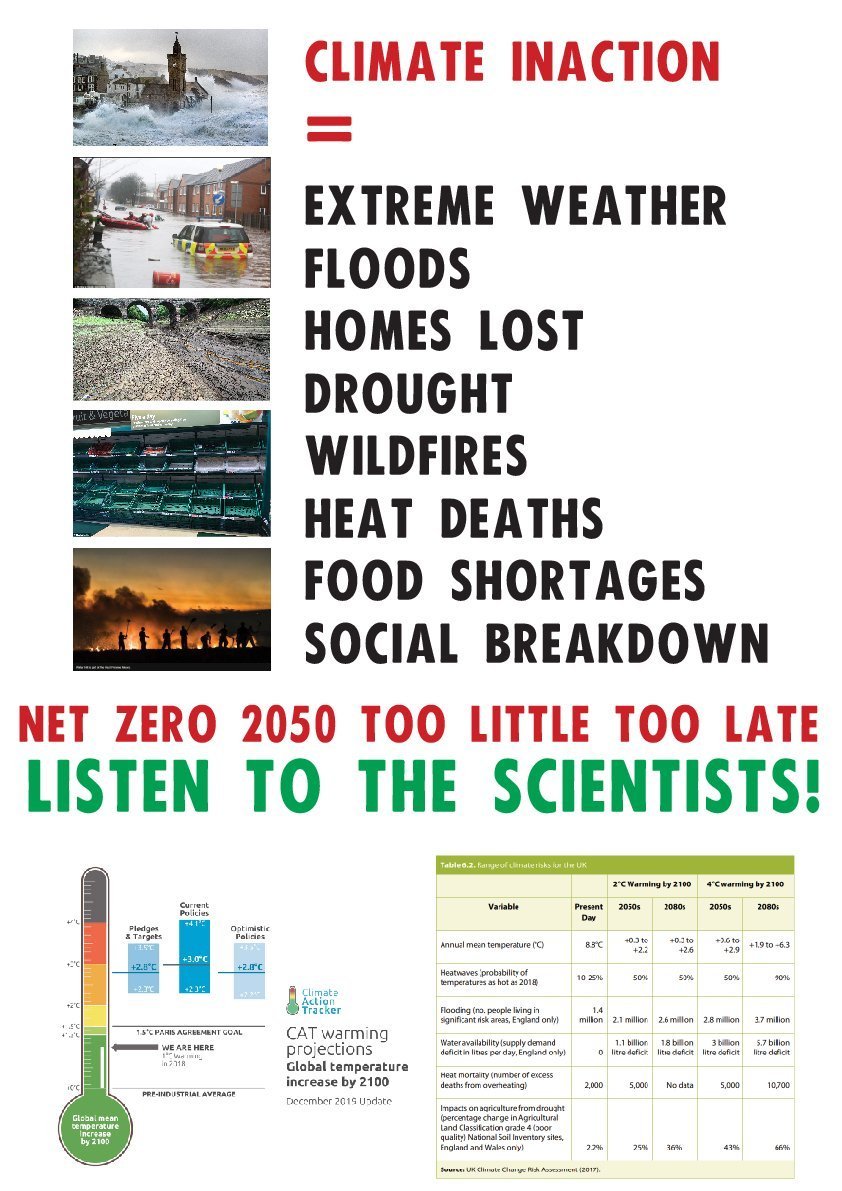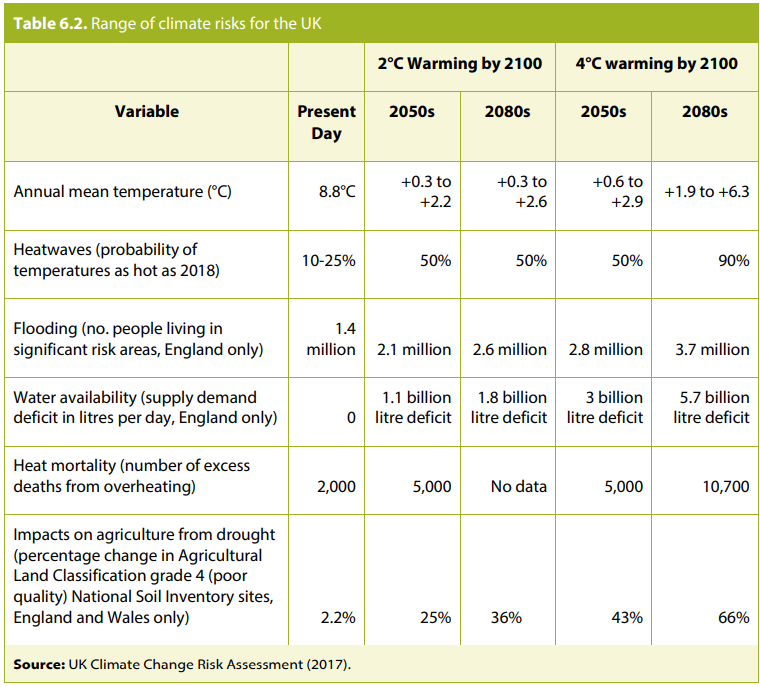Main image: Rebels marching in a slow procession with a banner saying INACTION = DEATH followed by a BBC Radio reporter with extended mike and rebels carrying a coffin
COMMITTEE ON CLIMATE CHANGE ADVISES GOVERNMENT TO PREPARE FOR APOCALYPSE
June 25, 2020 by Extinction Rebellion
#ExtinctionRebellion #ActNow #NoGoingBack
Today the Committee on Climate Change, the Government’s official climate advisors, released their report detailing what progress has been made one year on from the adoption of the target to reach net zero emissions by 2050. The report reveals a staggering lack of progress, with only four of the 21 indicators on track and two of 31 milestones reached on the road to net zero emissions.
The report maps the range of climate risks for the UK using 2˚C to 4˚C scenarios with little practical reference to the Paris Climate Agreement’s advised temperature limit of 1.5˚C, advising all departments to plan for “a minimum 2°C rise in global temperature with consideration of 4°C.”
Tim Crosland, Director of the volunteer-based climate litigation charity Plan B. Earth, said:
“In 2008 the CCC advised the Government that 4˚C was the threshold of “extreme danger”, to be avoided at all costs [1]. Today it is advising the Government to consider preparing for a 4˚C world [2]. As the leading climate scientist, Professor Johan Rockstrom has recently warned, a 4˚C world implies the loss of not just millions but billions of human lives [3], with racially marginalised communities and those in the Global South on the front line.
“It is madness to prepare for such a world and madness that the Bank of England is financing such an outcome [4]. To the contrary the Government, along with the G20 and others, must do everything possible to transition our economy to bring it into compliance with the Paris Agreement temperature limit of 1.5˚C, which it is Government policy to follow. It has no democratic mandate to use the COVID-19 financial stimulus to drive us to destruction.”

Use this to find their email: Write to Them.
Summary of the Report
Adrian kindly went through the actual report prior to our protest yesterday:
Early start this morning to review the 196 pages of the Committee on Climate Change‘s report “Reducing UK emissions – Progress Report to Parliament“! Heavy reading, but wanted to know what was in it prior to the protest today (see you all there!).
A direct link to the report is here: https://www.theccc.org.uk/wp-content/uploads/2020/06/Reducing-UK-emissions-Progress-Report-to-Parliament-Committee-on-Cli.._-002-1.pdf
There is a lot in here, but I pulled out the following sentances / paragraphs (any emphasises are mine):
- Page 14 – “This is a moment to improve the effectiveness of national planning for the threats from climate change that are already inevitable, as well as the uncharted but potentially catastrophic change if higher levels of warming occur.”
- Page 15 – “Public money should not support industries or infrastructure in a way that is not consistent with the future net-zero economy or that increase exposure to climate risks.
- Page 22 – “International aviation and shipping should be formally included in UK climate targets when the Sixth Carbon Budget is set, and net-zero plans should be developed.”
- Page 23 – “We began this Parliamentary term with an acute public health crisis, and delay to COP26; the UK now has the opportunity to lead a decisive response to the chronic crisis of climate change itself.”
- Page 25 – “Ahead of the CCC’s next adaptation progress report in 2021, demonstrate adaptation planning for a minimum 2°C and consideration of a 4°C global temperature rise (by 2100 from pre-industrial levels).”
- Page 59 – “When assessed prior to COVID-19 in 2019, the global emissions expected in 2030 based on current global ambition were not consistent with pathways expected to achieve the Paris Agreement’s goal of limiting global warming to well-below 2°C above pre-industrial levels and pursuing efforts to keep it below 1.5°C, but instead with those reaching around 3°C above preindustrial levels by 2100.”
- Page 67 – “The increase in the frequency and severity of heatwaves is having clear impacts, including on mortality in the UK”
- Page 113 – see table in the document – Delivery of policy action in the last year (evidence of governments lack of action/progress)
- Page 123 – “The rising prominence of grass roots protests is also of note. Extinction Rebellion is now a household name, and the student climate strikes in September 2019 were attended by hundreds of thousands in the UK alone.”
- Page 129 – “There will be no vaccine for climate change and it will not be possible to self-isolate from its impacts. It can only be tackled through a sustained response over decades covering all nations of the world, all sectors of the economy and all parts of society.”
- Page 129 – “In order to combat COVID-19, people in the UK have heavily restricted their movement with damaging economic and social consequences. This is not the blueprint for tackling climate change. Unlike COVID-19, many of the actions the UK can take on climate change can bring improvements to our quality of lives – cleaner air, quieter streets, more green spaces, comfortable homes and healthier lifestyles.”
- Page 139 – “Polling shows that two-thirds of British people believe that climate change is as serious a risk as COVID-19 in the long term, and 70% agree that if the Government does not act now to combat climate change, it will be failing the general public”
- Page 171 – “Overheating. Higher temperatures, particularly in the summer months could lead to a three-fold increase in the number of heat-related deaths by 2050 as well as exacerbating cardiac and respiratory illnesses.”
- Page 171 – “Both climate change in the UK and overseas will impact on the UK’s ability to maintain a secure food supply. While the risk of food shortages in basic staples is considered to be low from climate change alone, there is a high risk of food price shocks arising from extreme weather, which would have a disproportionate effect on lower income households. Climate change may also pose risks to food safety due to faster rates of spoiling and pathogens such as salmonella”
- Page 172 – Table – Range of climate risks for the UK













